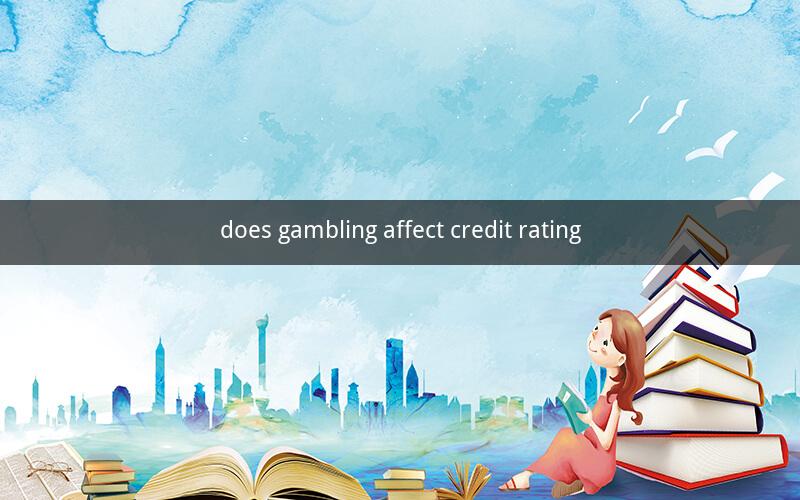
Table of Contents
1. Introduction to Credit Rating
2. Understanding Gambling and Its Impact
3. The Connection Between Gambling and Credit Rating
4. HowGambling Activities Can Affect Credit Rating
5. The Role of Creditors in Assessing Creditworthiness
6. Mitigating the Risk of Negative Impact
7. The Importance of Responsible Gambling
8. Conclusion
1. Introduction to Credit Rating
Credit rating is a crucial aspect of financial management. It reflects an individual's or entity's creditworthiness, indicating the likelihood of repaying debts. This rating is determined by various factors, including payment history, credit utilization, length of credit history, and types of credit used.
2. Understanding Gambling and Its Impact
Gambling, whether online or offline, involves risking money on the outcome of a game or event. While it can be a form of entertainment, excessive gambling can lead to financial difficulties, including debt and credit issues.
3. The Connection Between Gambling and Credit Rating
The connection between gambling and credit rating lies in the potential for gambling-related debt to negatively impact creditworthiness. Here's how:
4. HowGambling Activities Can Affect Credit Rating
a. Accumulating Debt: Excessive gambling can lead to significant debt, which may require borrowing money through credit cards or loans. This increased debt load can lower credit scores.
b. Late Payments: If gambling-related debt is not managed properly, it may result in late payments on credit accounts. Late payments can significantly damage credit ratings.
c. High Credit Utilization: Using a large portion of available credit can negatively impact credit scores. If gambling-related debt causes credit utilization to rise, it can harm a credit rating.
d. Multiple Credit Inquiries: Applying for new credit to cover gambling debts can lead to multiple credit inquiries, which can temporarily lower credit scores.
5. The Role of Creditors in Assessing Creditworthiness
Creditors use credit ratings to assess the risk associated with lending money. A lower credit rating indicates a higher risk of default, which may lead to stricter lending terms or rejection of the loan application.
6. Mitigating the Risk of Negative Impact
To minimize the risk of gambling affecting credit rating, consider the following strategies:
a. Set a Budget: Establish a budget for gambling activities and stick to it. This will help prevent overspending and accumulating debt.
b. Monitor Credit Scores: Regularly check credit scores to identify any potential issues early on.
c. Pay Off Debt: Prioritize paying off gambling-related debt to reduce the impact on credit scores.
d. Seek Professional Help: If struggling with gambling-related debt, consider seeking help from a financial advisor or credit counseling service.
7. The Importance of Responsible Gambling
Responsible gambling involves being aware of the potential risks and making informed decisions. Here are some tips for responsible gambling:
a. Set Time and Money Limits: Decide how much time and money you can afford to spend on gambling activities.
b. Avoid High-Stakes Games: Stick to low-stakes games to minimize the potential for significant losses.
c. Stay Informed: Keep up with the latest news and trends in the gambling industry to make informed decisions.
d. Seek Help if Needed: If you feel you may have a gambling problem, seek help from a professional or support group.
8. Conclusion
Gambling can have a significant impact on credit rating, particularly if it leads to excessive debt and late payments. By understanding the connection between gambling and creditworthiness and taking steps to mitigate the risks, individuals can protect their financial well-being.
Questions and Answers
1. How does gambling affect credit rating?
Gambling can affect credit rating by leading to excessive debt, late payments, high credit utilization, and multiple credit inquiries.
2. Can gambling-related debt be considered in a credit rating?
Yes, gambling-related debt can be considered in a credit rating, as it reflects an individual's overall financial responsibility.
3. How long does gambling-related debt stay on a credit report?
Gambling-related debt, like any other type of debt, can stay on a credit report for up to seven years from the date of the first late payment.
4. Can responsible gambling prevent negative impacts on credit rating?
Yes, responsible gambling can help prevent negative impacts on credit rating by minimizing debt and maintaining a healthy credit utilization ratio.
5. Can credit counseling services help with gambling-related debt?
Yes, credit counseling services can provide guidance on managing gambling-related debt and developing a plan to improve creditworthiness.
6. How can individuals monitor their credit scores?
Individuals can monitor their credit scores by obtaining a free credit report from each of the three major credit bureaus once a year.
7. Can a gambling addiction lead to bankruptcy?
Yes, a gambling addiction can lead to bankruptcy if the individual is unable to manage their gambling-related debt.
8. How can individuals seek help for a gambling addiction?
Individuals can seek help for a gambling addiction by contacting a professional or support group, such as Gamblers Anonymous.
9. Can gambling-related debt be discharged in bankruptcy?
In some cases, gambling-related debt may be dischargeable in bankruptcy, depending on the specific circumstances.
10. What are the long-term consequences of gambling-related debt?
The long-term consequences of gambling-related debt can include damaged credit rating, financial instability, and strained relationships with family and friends.